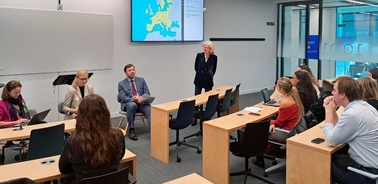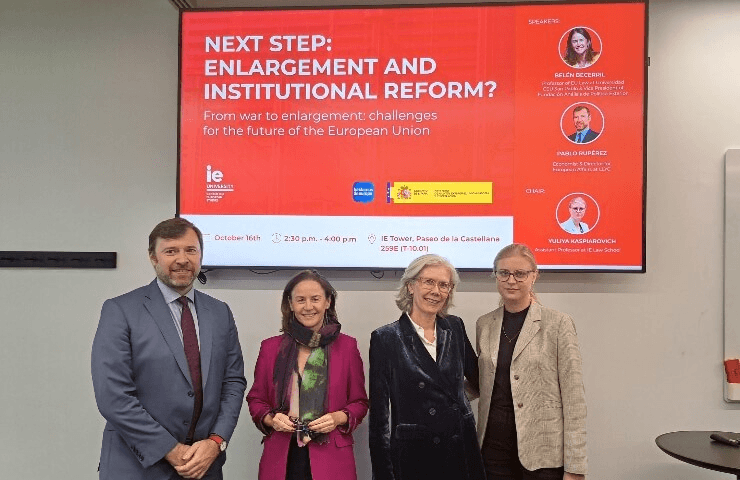- Home
- We Are Law School
- News
- The Next Step: Enlargement And Institution Reform? Discussing Challenges For The Future Of The Eu
The Next Step: Enlargement and Institution Reform? Discussing challenges for the future of the EU

The event, held at the IE Tower in Madrid, was hosted by IE Law School’s IE Center for European Studies.
On October 16, IE Law School’s IE Center for European Studies hosted the event “Next Step: Enlargement and Institutional Reform?”, where we welcomed renowned experts on the European geopolitical landscape to IE Tower to share their insights on the future of the European Union (EU).
Belén Becerril, professor of EU Law at Universidad CEU San Pablo and vice president of Fundación Análisis de Política Exterior, was joined by Pablo Rupérez, economist and director for European affairs at LLYC. IE Law School’s Assistant Professor Yuliya Kaspiarovich chaired the session, which was sponsored by the Spanish Ministry of Foreign Affairs, the European Union and Cooperation—specifically their “Hablamos de Europa” initiative. Hablamos de Europa aims to promote awareness and engagement about the European Union among Spanish citizens, focusing particularly on the organization’s impact on Spain.
Marie-José Garot, Associate Professor of Law at IE Law School and Director of IE Center for European Studies, introduced the speakers and opened the discussion. The speakers first addressed the key issue of enlargement within the EU and assessed whether a new treaty would be required in order to achieve it.
The discussion began with an overview of the EU’s enlargement treaty itself. Although the last time the EU last welcomed a new member state was in 2013, when Croatia joined, the speakers discussed how enlargement has always been a part of the EU’s policy, commenting that it has been open to welcoming new members without any limits.
Enlargement is a long and complicated process, with an application normally taking around nine years to complete. Currently, there are ten countries with cases to become member states. Montenegro is seen as the clear front runner, with the impression that “they could join in 2028.” But there are challenges to all ten countries’ candidatures.
"Enlargement is seen increasingly as a security question."
Discussion then moved on to potential risks and challenges associated with the process of welcoming new member states, highlighting the possibility of candidate states slowing down the process of implementing the necessary reforms in order to qualify, and member states closing their doors to enlargement.
A big question that exists in relation to the policy of enlargement is whether it can happen without reform within the EU. One view was that it is crucial: “We cannot move onto a Union of 30-35 states without making relevant changes within the EU.”
Major reform already happened in the EU in 2004, when ten new member states joined, strengthening individual rights and enhancing cooperation. However, the reforms did not include the extinction of unanimity voting in favor of majority voting, leading to slow and costly decision-making processes. It was pointed out that the system currently allows one member state to block any decision for any reason.
And in an increasingly complex political landscape, the perception of enlargement has shifted toward securitization. The panel engaged in an in-depth analysis, assessing the recent rightward shift in politics and its impact on the EU. The discussion covered the considerable difficulty inherent in leading the union with parties in the political sphere that move to undermine—or even destroy—that union.
"It is difficult to lead the union with parties that move to undermine—or even destroy—the union."
The discussion ended with a Q&A session in which attendees had the opportunity to pose their questions to the panel. There was further exploration of enlargement, with students probing the speakers on areas such as Brexit and the EU’s new relationship with the UK, immigration from North Africa and its potential impact on enlargement, and several questions around the potential entry of Moldova into the EU.
The session was both thought-provoking and insightful, giving attendees up-to-date and crucial insights on some of the most pressing issues and challenges within the European Union, both now and into the future.
IE Center for European Studies is a hub for reflection and dissemination on current European Union issues, aimed at contributing to key debates on the consolidation of European integration from economic, social, and legal perspectives.
